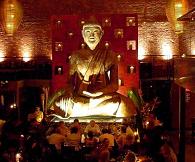 Picture yourself in one of the trendiest Manhattan restaurants. Fruity cocktails in deep martini glasses rest in many a manicured hand. Fashion is top-notch; this is New York after all. It’s dark, very dark. The lights are so dim that you can barely make eyes at that person across the room. Yet, many rise to the challenge (why else would you spend $12 for a drink?). You’re mid-flirt, cocktail in hand, you look up and what do you see? A giant Buddha statue–reaching from floor-to-ceiling–set back deep in the dining room, to watch over all the young socialites.
Picture yourself in one of the trendiest Manhattan restaurants. Fruity cocktails in deep martini glasses rest in many a manicured hand. Fashion is top-notch; this is New York after all. It’s dark, very dark. The lights are so dim that you can barely make eyes at that person across the room. Yet, many rise to the challenge (why else would you spend $12 for a drink?). You’re mid-flirt, cocktail in hand, you look up and what do you see? A giant Buddha statue–reaching from floor-to-ceiling–set back deep in the dining room, to watch over all the young socialites.
Such is the scene at Tao, a famed Manhattan restaurant (which some of you may know from its cameo as the location of the speed-dating scene in the movie “Hitch“).
On my first excursion there last night, I sat, like many others, sipping my Tao-tini and observing the action. It occurred to me that this kind of scene is exactly what the Buddha teaches his followers to stay away from; according to Buddhism, desire must be controlled. One of the mindfulness teachings for lay people is to give up alcohol. Monks and nuns take it further abstaining from alcohol and sex. I have some questions on this matter.
So what is the Buddha doing at Tao, watching people get drunk and meet each other? Was the restaurant sensitive to religion when creating its theme and designing the meditating, full-bellied Buddha? How would Americans respond to a Jesus-themed restaurant where all sorts of un-Christian activities took place? Americans, and particularly New Yorkers, fetishize the East so much that we don’t even notice the religious symbol just past the tip of our martini, and don’t care that we’re disrespecting it continuously there.
But instead of ranting on the subject last night (I saved that for today), I took the Buddha’s advice–paused, breathed, and briefly locked eyes with a suit across the room…


